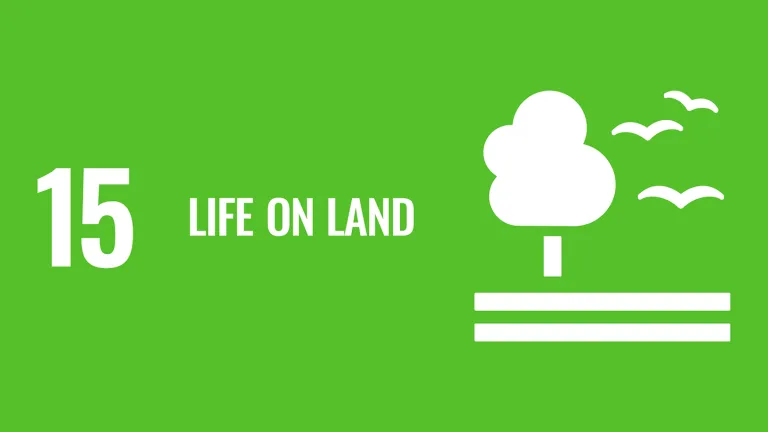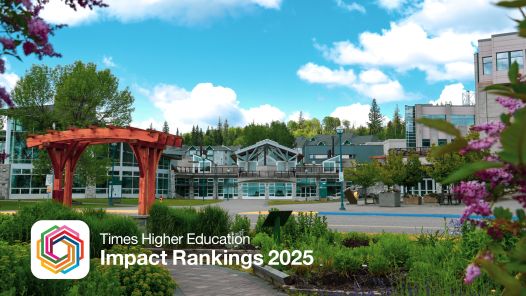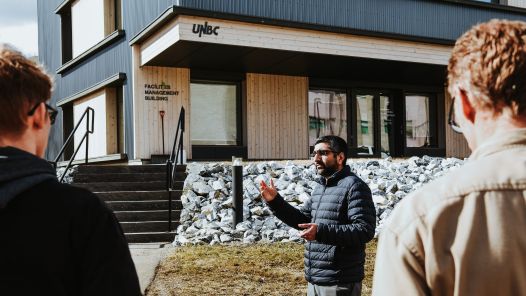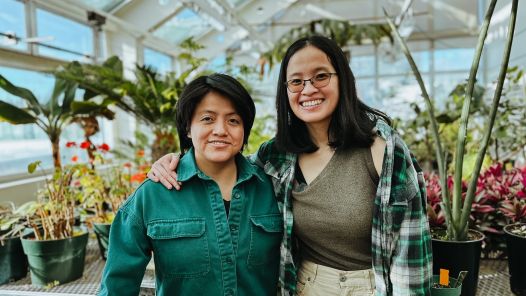
"Sustainably manage forests, combat desertification, halt and reverse land degradation, halt biodiversity loss."
Research Forests and Stations
UNBC has hundreds of acres of protected forest that is used for research.
Conservation Solutions Lab
The Conservation Solutions Lab (CSL) at UNBC advances UN Sustainable Development Goal 15: Life on Land by using interdisciplinary research and big data to protect and restore terrestrial ecosystems. Focusing on biodiversity, forest management, and human impacts on landscapes, CSL collaborates with conservation practitioners to develop actionable solutions that support sustainable land use and the conservation of biodiversity across local and global contexts.
For example, CSL PhD candidate José Aragón is conducting research on the human footprint in Peru and Ecuador, focusing on SDG 15 monitoring and planning. His work involves spatial dynamics of forests, local peoples, and human pressures, contributing to the conservation of biodiversity and sustainable land use.
Northern Wildlife Ecology and Conservation Lab (NWEC)
The Northern Wildlife Ecology and Conservation Lab (NWEC Lab) at the University of Northern British Columbia (UNBC) is dedicated to understanding and conserving northern wildlife and their habitats. Through research on species such as caribou, moose, and Pacific marten, the lab examines how human activities impact wildlife distribution and abundance. Their work supports SDG 15 by promoting the sustainable use and conservation of terrestrial ecosystems. Collaborating with Indigenous communities and government agencies, the NWEC Lab contributes to informed conservation strategies that protect biodiversity and support ecosystem resilience in Canada's northern regions.
UNBC Wildfire Workshop
The UNBC Wildfire Workshop is an interdisciplinary event held at UNBC. It brings together researchers, Indigenous knowledge holders, and community members to explore wildfire resilience and land stewardship. The workshop's themes include fire ecology, Indigenous fire knowledge, and the impacts of wildfires on communities and ecosystems. By integrating traditional ecological knowledge with scientific research, the event supports SDG 15 which aims to protect, restore, and promote the sustainable use of terrestrial ecosystems. This aligns with efforts to sustainably manage forests, combat desertification, and halt biodiversity loss. The workshop fosters collaboration and knowledge exchange to address the challenges posed by wildfires in northern and Indigenous communities.
UNBC Forestry Club Podcast
The UNBC Forestry Club Podcast invites listeners to explore the heart of British Columbia’s forests, featuring discussions on sustainable forestry, biodiversity, and conservation. It also highlights student experiences at UNBC, connecting community stories with environmental stewardship. By promoting awareness and understanding of responsible land management and ecosystem protection, the podcast aligns with SDG 15.
The UNBC Student Chapter of the Wildlife Society
The UNBC Student Chapter of The Wildlife Society (TWS) is a student-led organization at the University of Northern British Columbia dedicated to wildlife stewardship through science and education. Officially recognized by The Wildlife Society on March 4th, 2008, the chapter focuses on the research and management of both fisheries and wildlife. Its mission includes hosting regular activities, meetings, and field trips to expand members’ knowledge of fish and wildlife science and research, providing opportunities for members to gain field experience, offering access to a student mentorship program, and facilitating participation in activities and conferences sponsored by other chapters of TWS .
By engaging students in hands-on learning and fostering a deeper understanding of wildlife conservation, the chapter contributes to SDG 15 which aims to protect, restore, and promote the sustainable use of terrestrial ecosystems. Through its initiatives, the chapter supports biodiversity conservation and sustainable land management practices in northern British Columbia.
UNBC Enhanced Forestry Lab
The Enhanced Forestry Laboratory (EFL) was officially opened in April 2000 and continues to support controlled environment research and teaching at UNBC. Internal and external clients can access the lab’s space, equipment, and services through an online request system. Greenhouse technicians collaborate with faculty, students, and external users to support various research and teaching initiatives. A range of activities are managed by the greenhouse technicians. The IK Barber Enhanced Forestry Lab is located in Building 12 at the north end of campus, across from the power plant.
UNBC Herbarium
The UNBC Herbarium houses student collections donated for teaching purposes, as well as a master herbarium that includes many samples donated by the Royal BC Museum, some dating back to the 1940s and 1950s. While some of the mounts from the master herbarium are used for teaching, they have also been utilized for research. The herbarium also contains a cone collection, a fruit type collection, and a fungi/lichen collection. Additionally, it stores plant presses that are used by various classes. The David Douglas Botanical Garden Society Library is also located within the herbarium.
The Natural Resources and Environmental Studies Institute
The Natural Resources and Environmental Studies Institute (NRESi) builds connections among university researchers and communities or external experts to advance understanding of natural resources and the environment. NRESi facilitates collaborative projects that address complex issues involving ecological processes, social values, and earth science systems.
Within NRESi’s membership, there are more than 80 researchers with diverse expertise, who engage in a wide range of project themes. NRESi supports and develops research opportunities focused on collecting baseline information, as well as applying that knowledge to practical problems.
The David Douglas Botanical Garden Expansion Project
In partnership with UNBC, the David Douglas Botanical Garden Society is developing an 11-plus hectare garden at the campus entrance. The Expansion Project involves the growth of the 1.6-hectare garden located at the heart of UNBC’s campus, transforming it into a multi-use hub for research, recreation, respite, and community development. The expansion will include a visitor center featuring a classroom, gift shop, botanical library, and reception area, as well as various themed ornamental display gardens. It will also feature a walkway with overhead arbours and trellises, a wetland area with viewing platforms, and a hands-on research garden for UNBC faculty and students.
Sustainability in action at UNBC
Upcoming events
23
OctVermicompost Worms as Pets Workshop
Thursday5:00 p.m. to 7:00 p.m.
Prince George campusUNBC Prince George Campus Library Rm 5-178
25
OctGoodsir Nature Park Volunteer Trip with SGU
Saturday10:30 a.m. to 3:30 p.m.
Prince George campusGoodsir Nature Park, 22825 Old Summit Lake Rd, Prince George, BC
Explore the SDGs
UNBC is committed to advancing the United Nations Sustainable Development Goals (SDG) through a wide range of initiatives aimed at fostering sustainability, inclusivity, and global responsibility.


